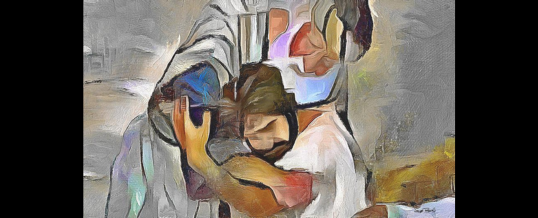
The Gospel this 4th Sunday of Lent is the parable of the prodigal son. We have listened to it countless times – the story of the father whose loving reception of his wayward son gave him a new life. It moves us every time we hear it. The message of grace and acceptance, no matter how far one falls, is one we need to hear again and again. The point of the parable could be to try harder to become like the forgiving father, be less like the jealous older son, and learn the meaning of love of self as the prodigal son finally learned in the compassionate arms of his father.
To some extent we can relate to the younger son in his weakness and straying. Sometimes we are often away from God by our weakness. But even when we make a mess of things, our loving God is ready to take us in. Forgiveness is the final form of love; it defies logic sometimes but we can receive it and also show forgiveness to those around us. I learned a valuable lesson when I was a teenager in the late 60s. My cousin came to live with us. She was in her early twenties and pregnant and needed to stay with people who would not judge her but look after her – my parents. She insisted she couldn’t tell her parents even though my parents tried to convince her that she should. She gave her beautiful baby up for adoption and never let her parents know about it. I remember and learned much from the words my father said to me; ” If you or your sister are ever in that situation you know you can come home to us, no worries.” The younger prodigal son would never forget the love and reception he received on returning home like I will never forget the love and acceptance my father related to me so long ago.
We can also relate to the older brother’s reaction to his brother’s return. The jealousy of the older son who doesn’t get the rewards for never straying we can identify with. He has done everything right but isn’t celebrated like his younger brother when he comes home. We can understand his resentment; it is all too human. I can also relate to the older son. My father died suddenly in 1970; in November 1971 my sister had her first child, a beautiful baby girl. My mother and I went to Toronto (where they lived) to celebrate Christmas and the christening of my niece. At the celebration, my brother-in-law’s father was holding her and I felt an overwhelming sense of loss and resentment. I thought “That should be our dad who is holding his grandchild, not him. My dad loved children so much”. It seemed so unfair. Then I was reminded that my brother-in-law’s father had every right to be so happy- she was his first grandchild too. My loneliness, jealousy and anger abated but for a while I was like the older son who didn’t want to accept the celebration when his brother came home.
This parable speaks to us of the meaning of reconciliation, of God’s forgiveness and the mercy God wants us to show to one another. The parable reminds us that it does not concentrate on representing just one type of person, but all of us are a mixture od sin and repentance, jealousy and resentment, and finally, it is hoped, overflowing compassion, forgiveness, and love toward others. It is a call to engage our hearts, our minds, and our life experiences and beliefs to turn inward toward the realization that our personal lives are a gift for the people around us and beyond. Like the father in the parable, God is always waiting for us; He never grows tired. Jesus shows us this merciful patience of God so that we can regain confidence, hope and readiness to forgive also. He wants us to express a love that is tangible, full and close to being unconditional.
~Cathy Keirstead
MAR
2025

About the Author: